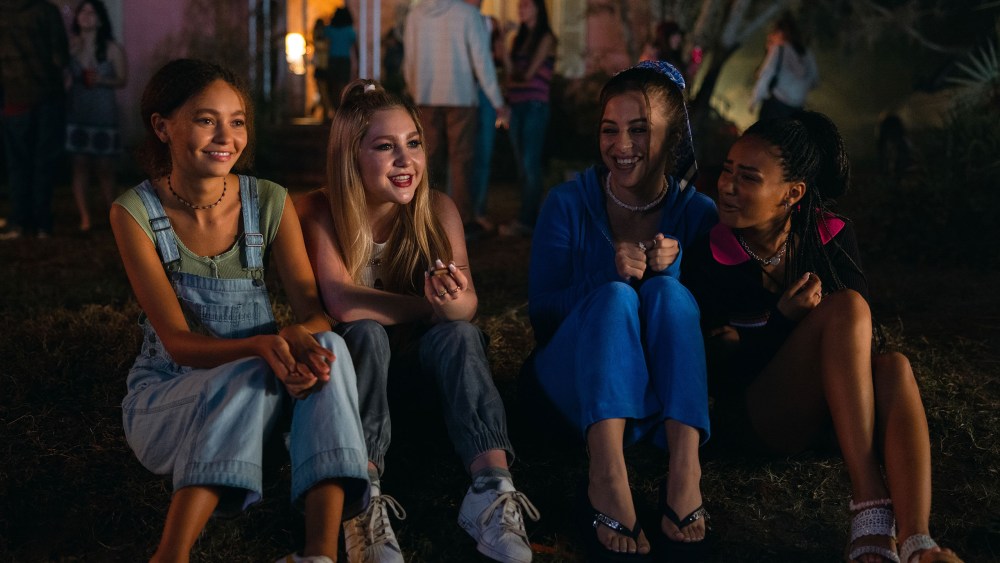Mother and Daughter Dive into the Ethics of Dying
It can feel discordant to see someone mourning amid the pastel-hued bungalows of a beach-bound town, beneath a blue sky. Not that single mom Kristine is grieving exactly in bittersweet, comedic Sundance drama “Suncoast” — a fact Laura Linney’s character makes decidedly clear to a counselor at the hospice center of the title. After all, her son Max (a very still Cree Kawa), who’s dying of brain cancer, isn’t gone yet; he’s just no longer there.
Daughter Doris (Nico Parker), however, is still very present, and she’s bristling under years of Kristine’s not-grieving and Max’s unresolved state. If that sounds harsh, it really isn’t. In her semi-autobiographical directorial debut, Laura Chinn places her sympathies with the child who isn’t ill, at least at the outset. Doris has been conscripted into the kind of caretaking that can tax even the most trained of adults, one that has robbed her of space for growing up.
An amiable ensemble effort, with two sturdy lead performances, “Suncoast” is reminiscent of the minor-key, quirky-charming ’90s dramedies so often discovered by the Sundance Film Festival. This is a fine thing; there are deserved laughs and tears. It is also a slightly awkward thing. “Suncoast” feels crowded with overworked moments that ask us to wrestle with terminal illness and the ethics of euthanasia, with right-to-die arguments and the privilege of coming of age.
The story takes place in Chinn’s hometown of Clearwater, Fla., in 2005, as one of the nation’s bitter, headline-grabbing sagas is playing out. Michael Schiavo has been fighting in the courts to have wife Theresa “Terri” Schiavo’s taken off life support. Although, she’s been in a vegetive state for 15 years, her parents have been contesting his efforts.
It’s an especially unsettling time for Kristine to have moved Max from their home to the hospice center where Schiavo resides. Outside Suncoast, throngs gather with signs. The majority are protesting the possibility that a court will side with Michael and remove Terri’s feeding tube. One of the less vitriolic placards: “Call the FBI!!! A Crime’s Being Committed.”
The drone and barks of the protesters, plus the added layer of security at the hospice, would merely make for a harsh background hum to the goings on in Max’s room were it not for Paul. Woody Harrelson plays the seeming beach bum who befriends Doris. He’s a widower with strong opinions about dying and love, and he shares them over the course of the movie with Doris. Harrelson makes a character that feels too concocted less so.
Never one to shy away from unpleasant characters, Linney digs into Kristine’s worst behavior at her lowest moment. She is hard-mouthed and fuming, the way one can get when there’s absolutely nothing to be done to change the excruciating inevitable. Because we were dropped into the tail end of the family’s crucible, we have little idea how soft her edges, or how good a mom she may have been. She is set on rebuffing sympathy.
Of course, Doris gets the brunt of her mom’s moods. Though the hospice’s head nurse (Eyla Monterroso Mejia) and a police officer (Jason Burkey), tasked with making sure no one enters the hospice with terror in mind, aren’t spared her condescension or ire.
Parker does well as Doris, the hardly ugly but uncertain duckling that takes a seat in the back row in class and stays mum. That is until an opportunity to connect with the cool kids at her private Catholic school presents itself. Soon she’s hosting parties at her modest home, while Kristine has taken a cot at Max’s bedside.
Chinn teases us with the tropes of the high school genre. Matt Walsh portrays the dull (but not really) teacher who utilizes the Schiavo contretemps as a teachable moment. And we are often on edge, as is tentative Doris, about when her new friends, the well-off cool kids — Laci (Daniella Taylor), Brittany (Ella Anderson), Megan (Ariel Martin) and Nate (Amarr) — will morph into the cruel kids. When will they go all “Carrie” on her? No spoilers here, but the writer-director’s treatment of these sometimes-clueless teenagers feels more grounded than, say, “Bottoms” — which doesn’t mean “Suncoast” is better only that Chinn’s choices are admirable and emotionally ambitious.
“Suncoast” premieres Feb. 4 on Hulu, which feels like the right strategy. Who wants to ugly cry in theater?

